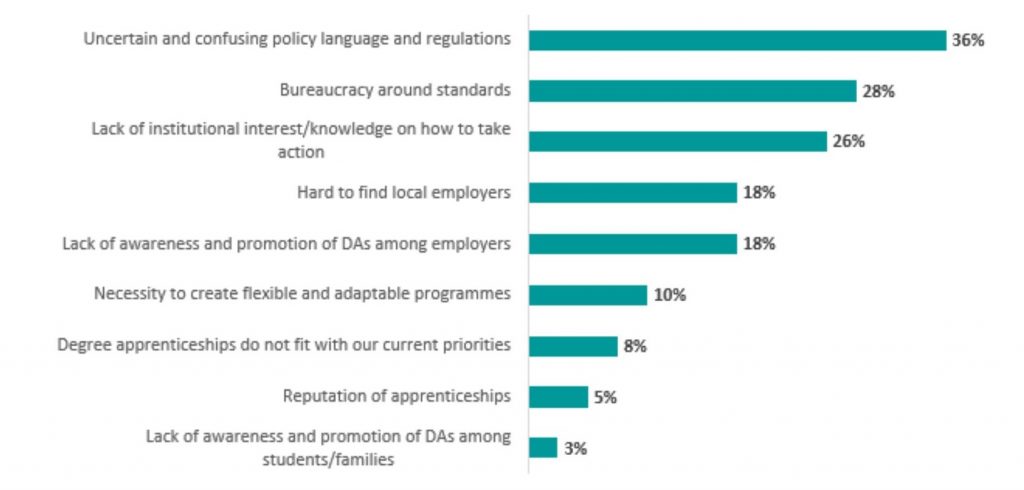The strong enthusiasm for degree apprenticeships is being countered by confusion over policy and regulations and the burdensome bureaucratic process needed to implement them, a Universities UK report has found.
Representing the sector primarily charged with offering the relatively new DAs – announced in 2015 – UUK said the necessity to create programmes that were flexible and adaptable to a range of different employers created its own problems.
“Overall, there is strong enthusiasm for degree apprenticeships, but confusion over policy and regulations, and the burdensome bureaucratic process required for their implementation risks reducing their potential,” Degree apprenticeships: understanding the opportunities said.

Challenges: the main barriers to the implementation of degree apprenticeships. Credit: UUK
A survey, conducted in July at a roundtable meeting of 39 organisations – including 30 universities, six employer organisations and government representatives – looked at the important role universities would play in the delivery of DAs.
Access to a new student market was the most cited benefit of degree apprenticeships, with almost 54 per cent of delegates putting it first.
Just over 40 per cent of delegates said DAs could favour business engagement and offer institutions the opportunity to create closer links with employers. Employers and the economy as a whole would benefit too.
A third of delegates said DAs would ensure provision of vocational education relevant to employers and 13 per cent believed degree apprenticeships could stimulate growth and promote regional development.
“Furthermore, according to 28 per cent of respondents, institutions as providers could benefit from the new income stream coming from degree apprenticeships,” the report said.
The most cited category of challenges is policy and regulations-related, with 36 per cent of issues mentioned by delegates falling in to this category.
Uncertainty round the policy landscape and the timeline for the implementation of degree apprenticeships were identified as the main challenge in this category.
“Some respondents also complained about the lack of information and guidance, and about the lack of standards for delivery,” the report said.
“In addition to that, there is considerable confusion around what degree apprenticeships are, the [apprenticeship] levy, and the process for standards’ approval.”
Just over a quarter of delegates suggested that a lack of institutional interest in degree apprenticeships, and/or the lack of staff trained to manage degree apprenticeship projects were important barriers to implementation.
And 8 per cent of respondents said a major challenge to DAs lay in the “initiative overload” to which institutions were currently exposed.
“The presence of urgent priorities is diverting the attention from degree apprenticeships, delaying their implementation,” the report said.
Some respondents also found it difficult to identify employers potentially interested in degree apprenticeships, in particular at the local level, with 18 per cent of respondents saying that the lack of awareness of DAs among employers was a major issue.
“The main feature of degree apprenticeships is that programmes are co-designed with employers to address their skills gaps. However, this feature is also one of the obstacles to implementation,” the report said.
“The necessity of creating programmes that are flexible and adaptable to a range of different employers, often within the same standard or framework, is creating further challenges for institutions, as 10 per cent of delegates suggested.”
The report called for more research on DAs and the promotion and marketing of case studies and the sharing of good practice.
By Aban Contractor




